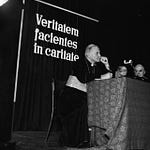The third issue addressed in the second chapter of Veritatis Splendor may be unfamiliar to many Catholics — fundamental option. The notion of the morally decisive fundamental option gained importance during the theological turmoil of the 1960s and 70s. There is a fundamental option open to every one of us — to be for Christ or against him. When St Peter responded to Christ, “to whom else shall we go? You have the words of eternal life”, he exercised that option. When Judas betrayed Christ he also exercised it by turning away from Jesus. But this is not the form that recent moral theologians have taken that option.
The “fundamental option” spoken of in the past sixty years has been conceived as a non-categorical transcendental decision that cannot be identified with any specific action. It is an action that completely identifies a person’s fundamental freedom. So, Judas may, in a moment of confusion, have offered to betray Christ for thirty pieces of silver, but this single episode need not have characterized his whole self.
The importance of this for moral theology is that it makes mortal sin almost impossible. Can an even lasting a few minutes on Thursday afternoon determine a person’s relationship with God for all eternity. The Church has always taught that certain acts can indeed deprive a person of sanctifying grace such that if one dies unrepentant of that he will be damned for eternity. So, it is proposed that instead of two categories of sin — mortal and venial — there are three. Some sins may well be grave because of the seriousness of the wrong done (murder or adultery, for instance), but not necessarily mortal.
John Paul II argues that this is understands the nature of the free moral act, that every act we performs arises from the will’s decision concerning the good. A human act cannot be divorced from the truth about the good. This has always been the Church’s authoritative teaching. The reasons for this will become clearer in the next section, which we will treat in the next podcast.












Share this post